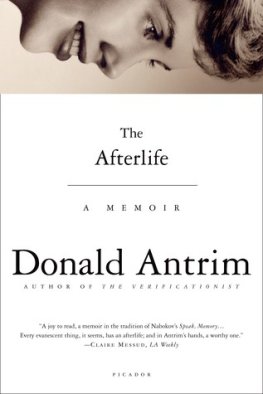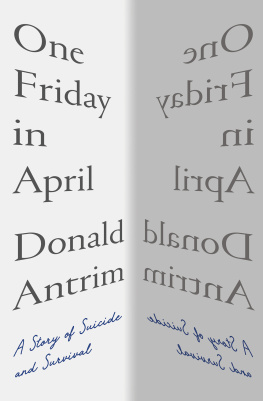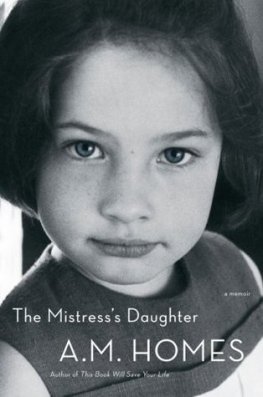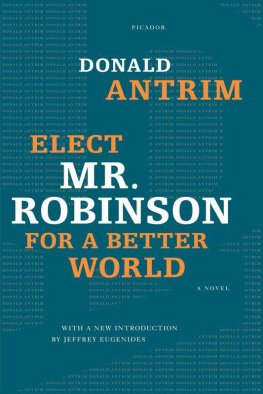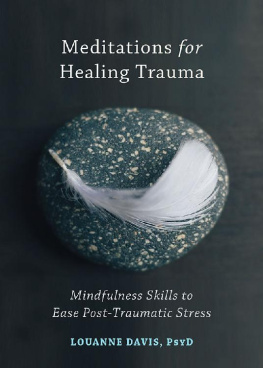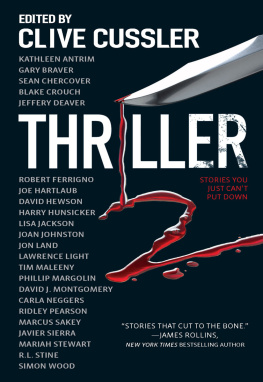Donald Antrim
The Afterlife: A Memoir

My mother, Louanne Antrim, died on a fine Saturday morning in the month of August, in the year 2000. She was lying in new purple sheets on a hospital-style bed rolled up next to the green oxygen tanks set against a wall in what was more or less the living room of her oddly decorated, dark and claustrophobic house, down near the bottom of a drive that wound like a rut past a muddy construction site and backyards bordered with chain-link fence, coming to an end in the parking lot that served the cheerless duck pond at the center of the town in which she had lived the last five years of her life, Black Mountain, North Carolina. The occasion for my mothers move to North Carolina from Florida had been the death of her father, Don Self, from a heart attack, in 1995. Don Selfs widow, my mothers mother, Roxanne, was at that time beginning her fall into senility, and was, in any case, unequipped to manage the small estate that my grandfather had left in her name. What I mean to say is that my grandmother, who came of age in the Great Depression and who brought away from that era almost no concept of money beyond the idea that it is not good to give too much of it to ones children, was unlikely to continue her husbands tradition of making large monthly transfers into my mothers bank account. Don Self had kept his daughter afloat for a long while ever since shed got sober, thirteen years before, and decided that she was an artist and a visionary, ahead of her time and now, suddenly, it was incumbent on my mother to seize power of attorney over her mother and take control of the portfolio, a coup she might have accomplished from Miami but was better able to arrange through what in the espionage community is known as closework.
Four years later, Roxanne Self passed away. The funeral was held at the Black Mountain Presbyterian Church in September of 1999. A week after that, my mother barely days after having got, as I heard her proclaim more than once, free of that woman, now Im going to go somewhere I want to go and live my lifewent into the hospital with a lung infection and learned that she, too, would shortly be dead.
She was sixty-five and had coughed and coughed for years and years. There had never been any talking to her about her smoking. The news that she had cancer came as no surprise. It had grown in her bronchi and was inoperable. Radiation was held out as a palliative it might (and briefly did) shrink the tumor enough to allow air into the congested lung but my mother was not considered a candidate for chemotherapy. She had, during the course of forty years of, as they say, hard living, progressively and inexorably deteriorated. The story of my mothers lifelong deterioration is, in some respects, the story of her life. The story of my life is bound up in this story, the story of her deterioration. It is the story that is always central to the ways in which I perceive myself and others in the world. It is the story, or at any rate it is my role in the story, that allows me never to lose my mother.
With this in mind the story of my mother and me, my mother in me I will try to tell another story, the story of my attempt, during the weeks and months following her death, to buy a bed.
I should say to keep a bed. I bought several. The first was a big fat Stearns & Foster queen from Bloomingdales at Fiftyninth Street and Lexington Avenue, in New York City. My then girlfriend, R., came along to the store, and together we lay down and compared. Shifman? Sealy? Stearns & Foster? Soft? Firm? Pillow top? I watched R. crawl across a mattress; she bounced up and down with her ass in the air, and I found myself thinking, delusionally, about myself in relation to my mother, who had died the week before, At last, Im free of that woman! Now Im going to buy a great bed and do some fucking and live my life.
Two thousand dollars.
Three thousand dollars would have got me a bigger, fatter Stearns & Foster (and, by extension, a bigger, fatter amount of comfort, leading to more contented sleeping, a finer state of love, and, in general, a happier, more productive life) or a nearly top-of-the-line Shifman. The Shifmans were appealing, thanks to the companys advertisements describing traditional (anachronistic?) manufacturing details such as the eight-way, hand-tied box spring; and to its preference for natural fibers (compressed cotton and wool) over synthetic foams.
What do you think, hon? Do you like the pillow top?
The big one over there?
Yes.
That ones great.
How long will one of these things last? Did the guy say?
Donald, get the bed that feels best. Youll be able to buy other beds later.
Later? What do you mean, later? Later in life?
If you get a bed and you dont like it you can send it back. Look. You have thirty days. People send beds back all the time. Thats what department stores are for.
Right.
Donald, this is something to be excited about! Youre buying a great bed for yourself. You deserve it! We should celebrate.
Yeah.
Are you okay?
Huh?
Do you want to try them one more time?
Which is what we and, increasingly, I, alone did. I bought bed no. 1 using my debit card in early September 2000, went home, called the store, and refused to have it delivered, then went back and upgraded, in late September, to another and more expensive bed (the pillow top), and refused to have that one delivered, after which I set out on what amounted, in retrospect, to a kind of quest, or even, one might say, a pilgrimage, to many stores, where I tossed and turned and held repetitive, obsessive conversations with professionals and, whenever possible, patient, accompanying friends, my lay public, about beds. Three months passed, during which time I came to learn more than I ever thought I would about mattresses and about the mattress industry in general not only about how and where the beds are made but about how they are marketed and sold, and to whom and, as it happened, I learned about other things besides actual beds. I am referring to blankets, pillows, and sheets.
It might be helpful at this point to say that, during this time that was described and possibly defined by compulsive consumerism, I had a keen sense of myself as a matricide. I felt, in some substantive yet elusive way, that I had had a hand in killing my mother. And so the search for a bed became a search for sanctuary, which is to say that the search for a bed became the search for a place; and of course by place I mean space, the sort of approximate, indeterminate space one might refer to when one says to another person, I need some space; and the fact that space in this context generally consists of feelings did not prevent me from imagining that the spaceconsidered, against all reason, as a viable location; namely, my bedroom could be filled, pretty much perfectly, by a luxury queen-size bed draped in gray-and-white-striped, masculine-looking sheets, with maybe a slightly and appropriately feminine ruffled bed skirt stretched about the box spring. And I imagined, quite logically, considering my grief over my mothers passing and over my participation, not only in the event of her death that August morning but, as a child and as a man, in the larger narrative of her lifelong self-obliteration through alcoholism and alcoholisms chief symptom and legacy, rage I imagined, or fantasized, that, once cozy and secure in the space filled by the bed, lying alone or with R. atop pillows stacked high like the pillows on beds photographed for home-decorating magazines, I might discover who I would be and how I would carry on without my mother, a woman who had died in a dreary house, in an uncomfortable bed.

